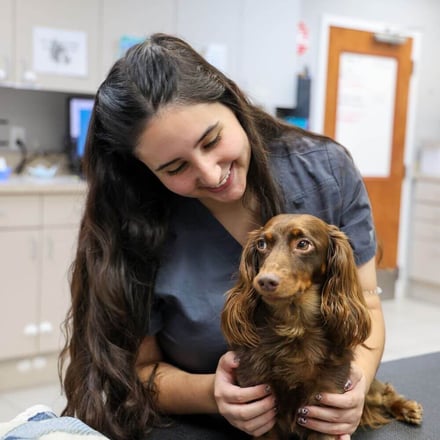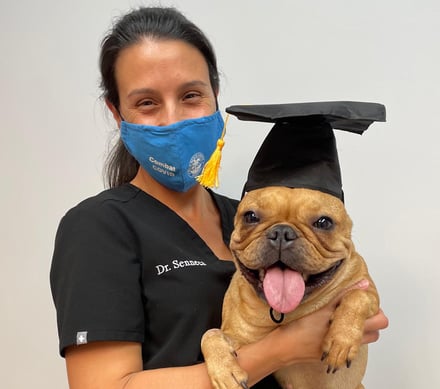Veterinary Spinal Surgery
Home » Diagnostics and Treatment » Spinal Surgery

Why does my pet need spinal surgery?

Pets may need to undergo spinal surgery for a variety of reasons, such as to relieve pressure on the spinal cord due to a slipped disc, tumor, or fluid pocket; fix broken bones in the back or neck; or realign and stabilize a dislocated joint in the back or neck.
If your pet is experiencing neck or back pain, dragging its rear limbs, or having difficulty walking, it can be scary to hear that it may need spinal surgery. But you can rest assured knowing that the neurologists at Southeast Veterinary Neurology (SEVN) perform spinal surgeries every single day. In fact, we have helped over 20,000 pets regain their ability to walk. If your pet needs spinal surgery, we are confident that there are no better hands than ours.
Spinal Surgeries We Perform
at Southeast Veterinary Neurology
INTERVERTEBRAL DISC DISEASE
The most common reason for spinal surgery is to treat intervertebral disc disease (IVDD), commonly referred to as bulging, ruptured, herniated, or slipped disc. IVDD may cause back or neck pain, wobbly walking, or complete paralysis of the rear limbs or all four limbs. Not all dogs with IVDD will need surgery, and we will only recommend it if the likelihood of improving their condition outweighs any downsides of surgery.
Situations for which we would recommend surgery include:
- Neck or back pain that is either not improving or getting worse after a week of medication and rest
- Recurrent neck pain, back pain, or wobbly walking
- Inability to walk in the rear limbs or all four limbs
Prognosis depends on the reason for symptoms, the severity of the injury, and how quickly treatment is received. This is why it is so important that your pet be examined by a pet neurologist as soon as possible.
TUMOR REMOVAL
Dogs and cats can get spinal cord tumors. Some of these tumors are best treated with surgery, depending on type and location. Your vet neurologist will let you know if surgery is an option for your pet’s particular case and discuss the benefits, risks, and likely success with you in depth.
CONSTRICTIVE MYELOPATHY (PUG MYELOPATHY)
Adult and senior pugs may develop difficulty walking in their rear limbs. This is often caused by a condition we call constrictive myelopathy, in which a fluid pocket develops outside of the spinal cord. This pocket is believed to be caused by a band of scar tissue surrounding the spinal cord like a belt. Surgery may be recommended to relieve the fluid buildup and stabilize the bones of the back.
ATLANTOAXIAL INSTABILITY
Young small and toy breed dogs can develop a dislocation between the first two bones in the neck, known as atlantoaxial (AA) luxation. This can cause pain, weakness, and wobbly walking in all four limbs. If we diagnose your pet with this condition, your vet neurologist may recommend surgery to realign the bones of the neck and stabilize them in the correct position. Surgery is often curative.
TRAUMA
Spinal trauma due to things like dog bites, gunshot wounds, or automotive accidents can also be treated with surgery.

Why choose Southeast Veterinary Neurology for veterinary spinal surgery?

Our veterinary neurologists are highly skilled in neurology and neurosurgery, including spinal surgery. We have performed thousands of successful spinal surgeries over the years and receive patients from all over the world. However, we will only recommend surgery if we think it is the best plan for your pet after discussing all options, pros, and cons with you.